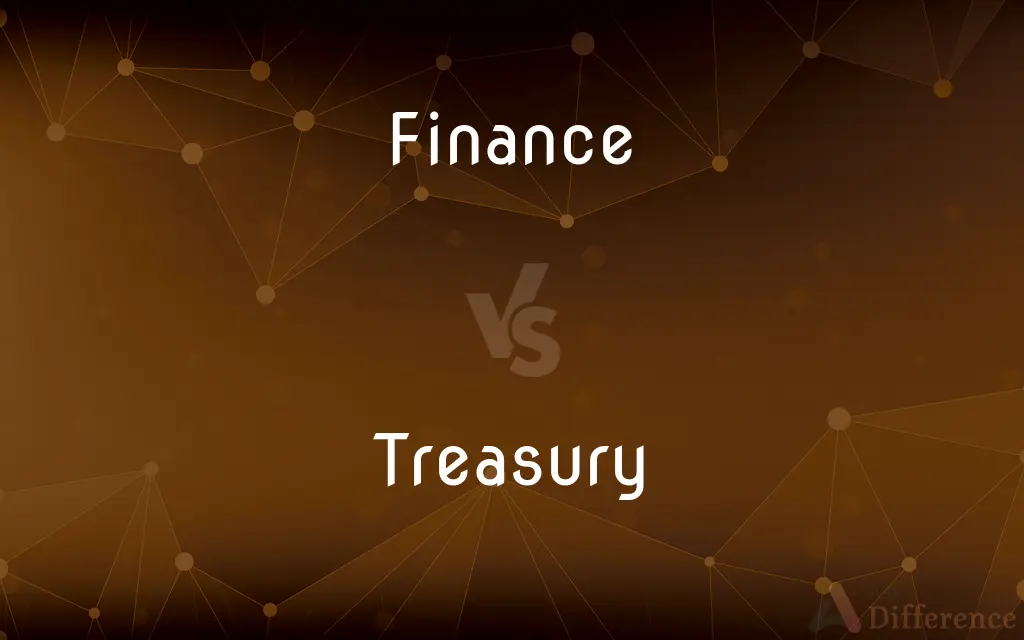Finance vs. Treasury — What's the Difference?
By Tayyaba Rehman & Fiza Rafique — Updated on April 30, 2024
Finance encompasses the management of money, including investing, borrowing, lending, and budgeting across all sectors; the Treasury specifically refers to the government department responsible for managing national revenue, expenditure, and public debt.

Difference Between Finance and Treasury
Table of Contents
ADVERTISEMENT
Key Differences
Finance is a broad term that refers to the management of funds, whether at the individual, corporate, or government level. It involves activities such as investing, budgeting, banking, and forecasting. On the other hand, the Treasury is a specific government department dedicated to managing the economic resources of a country, including its revenue, expenditures, and debt obligations.
In finance, both private and public sectors focus on asset and risk management to maximize returns and minimize financial risks. Whereas, the Treasury specifically deals with the government’s finances, ensuring economic stability, issuing government bonds, and managing national accounts.
Finance includes various subfields such as personal finance, corporate finance, and public finance, each dealing with different scopes and scales of financial management. In contrast, the Treasury's role is inherently governmental, focusing on fiscal policies, tax collection, and funding government operations.
The professionals working in finance range from personal financial advisors to investment bankers and financial analysts, who apply financial theories to improve profitability and manage financial portfolios. On the other hand, Treasury officials are primarily concerned with macroeconomic policies, public sector funding, and maintaining the fiscal integrity of the nation.
In terms of economic impact, finance as a whole influences global economies through capital markets, investments, and financial services. The Treasury, while more focused, plays a crucial role in shaping national economic policies and has a direct impact on a country’s financial health and credit rating.
ADVERTISEMENT
Comparison Chart
Scope
Broad, covering all aspects of money management
Specific to government financial management
Key Activities
Investing, lending, budgeting, saving
Tax collection, government budgeting, debt management
Subfields
Personal finance, corporate finance, public finance
None, operates as a singular government entity
Primary Concern
Profit maximization, risk management
National economic stability, fiscal policies
Impact
Global financial markets, corporate growth
National economy, government spending
Compare with Definitions
Finance
The management of large amounts of money, especially by governments or large companies.
The corporation’s finance department handled all the investment decisions.
Treasury
The government department responsible for developing and executing the national budget.
The Treasury announced changes to the taxation policy.
Finance
A field concerned with the allocation (investment) of assets and liabilities.
Finance theories often address the ways to minimize risks and maximize profits.
Treasury
Manages the issuance of government bonds and national debt instruments.
The Treasury issued new bonds to finance the infrastructure projects.
Finance
Personal management of money including saving and investing.
Good personal finance management is crucial for long-term financial security.
Treasury
Collects national revenues such as taxes and duties.
The Treasury reported an increase in revenue from new tax laws.
Finance
The process of obtaining funds or capital for any kind of expenditure.
Acquiring finance for the new project was a challenge due to its scale.
Treasury
Oversees national fiscal policies to ensure economic stability.
The Treasury intervened to stabilize the national currency.
Finance
The study and system of money, investments, and other financial instruments.
He studied finance at university to pursue a career in banking.
Treasury
Handles the management and reporting of government expenditures.
The Treasury is auditing all departments to cut unnecessary expenses.
Finance
Finance is a term for matters regarding the management, creation, and study of money and investments. Specifically, it deals with the questions of how an individual, company or government acquires money – called capital in the context of a business – and how they spend or invest that money.
Treasury
A treasury is either A government department related to finance and taxation, a finance ministry. A place or location where treasure, such as currency or precious items are kept.
Finance
The management of money, banking, investments, and credit.
Treasury
A place in which treasure is kept.
Finance
Finances Monetary resources
Could not make the purchase because of limited finances.
Treasury
A place in which private or public funds are received, kept, managed, and disbursed.
Finance
The supplying of funds or capital.
Treasury
Such funds or revenues.
Finance
To provide or raise the funds or capital for
Financed a new car.
Treasury
A collection of literary or artistic treasures
A treasury of English verse.
Finance
To supply funds to
Financing a daughter through law school.
Treasury
The department of a government in charge of the collection, management, and expenditure of the public revenue.
Finance
The management of money and other assets.
Treasury
A debt security, such as a bond, issued by the US Treasury.
Finance
The science of management of money and other assets.
Treasury
A place where treasure is stored safely.
Finance
Monetary resources, especially those of a public entity or a company.
Who's really in charge of a democracy's finances?
Treasury
A place where state or royal money and valuables are stored.
Finance
The provision of a loan, payment instalment terms, or similar arrangement, to enable a customer to purchase an item without paying the full amount straight away.
Finance on all our new cars is provided by ABC Loans Ltd.
Treasury
(government) treasury department
Finance
(intransitive) To conduct, or procure money for, financial operations; manage finances.
Treasury
A collection of artistic or literary works.
Finance
To pay ransom.
Treasury
(obsolete) A treasure.
Finance
(transitive) To manage financially; be financier for; provide or obtain funding for a transaction or undertaking.
His parents financed his college education.
He financed his home purchase through a local credit union.
Treasury
A place or building in which stores of wealth are deposited; especially, a place where public revenues are deposited and kept, and where money is disbursed to defray the expenses of government; hence, also, the place of deposit and disbursement of any collected funds.
Finance
To extort ransom from.
Treasury
That department of a government which has charge of the finances.
Finance
The income of a ruler or of a state; revenue; public money; sometimes, the income of an individual; often used in the plural for funds; available money; resources.
All the finances or revenues of the imperial crown.
Treasury
A repository of abundance; a storehouse.
Finance
The science of raising and expending the public revenue.
Treasury
Hence, a book or work containing much valuable knowledge, wisdom, wit, or the like; a thesaurus; as, " Maunder's Treasury of Botany."
Finance
To conduct the finances of; to provide for, and manage, the capital for; to financier.
Securing foreign capital to finance multitudinous undertakings.
Treasury
A treasure.
Finance
The commercial activity of providing funds and capital
Treasury
The funds of a government or institution or individual
Finance
The branch of economics that studies the management of money and other assets
Treasury
The government department responsible for collecting and managing and spending public revenues
Finance
The management of money and credit and banking and investments
Treasury
The British cabinet minister responsible for economic strategy
Finance
Obtain or provide money for;
Can we finance the addition to our home?
Treasury
The federal department that collects revenue and administers federal finances; the Treasury Department was created in 1789
Finance
Sell or provide on credit
Treasury
A depository (a room or building) where wealth and precious objects can be kept safely
Common Curiosities
Who works in finance and treasury departments?
Finance professionals include bankers, financial advisors, and analysts; Treasury personnel typically include government officials and economists.
How do the roles of finance and treasury differ in economic crises?
In crises, finance sectors seek to mitigate losses and capitalize on new opportunities, while treasuries may increase spending or adjust policies to stabilize the national economy.
Can the principles of finance apply to managing a treasury?
Yes, financial principles such as risk management and budgeting are applicable in treasury management, but with a focus on national economic goals.
How do private companies utilize finance?
Private companies utilize finance for budgeting, investment decisions, financial reporting, and to ensure overall financial health.
How does the treasury affect everyday citizens?
The treasury impacts citizens through taxation, government spending, and overall economic policy, which can influence employment rates, inflation, and public services.
Is the treasury involved in international finance?
Yes, treasuries engage in international finance by managing foreign exchange reserves, international debts, and relationships with global financial institutions.
What impact do global events have on finance and treasury?
Global events can significantly affect finance by disrupting markets and investments, while treasuries may need to adjust policies to address economic impacts.
What is the main difference between finance and treasury?
Finance broadly deals with the management of money and includes various financial activities and services, while the Treasury is specifically a government department focused on managing national finances and economic policy.
What educational background is typical for professionals in finance and treasury?
Finance professionals often have degrees in finance, economics, or business, whereas treasury officials might also have backgrounds in public administration or economic policy.
What role does technology play in finance and treasury?
Technology plays a crucial role in both fields by enabling sophisticated data analysis, financial modeling, and online transaction systems.
How are decisions made in finance and treasury?
Decisions in finance are often driven by profit maximization and risk assessment, whereas treasury decisions are influenced by policy objectives and economic forecasts.
What tools do treasuries use to manage the economy?
Treasuries use tools like bond issuance, setting interest rates, and adjusting tax policies to manage economic conditions.
How do finance and treasury adapt to economic downturns?
Finance sectors may focus on liquidity and cost-cutting, while treasuries might implement stimulus measures or adjust fiscal policies to mitigate economic impacts.
Do finance and treasury collaborate in any way?
Yes, in government, the finance and treasury departments collaborate to formulate budgets and ensure effective fiscal management.
What are common challenges faced by finance and treasury professionals?
Finance professionals often tackle challenges related to market volatility and regulatory changes, while treasury professionals deal with national debt levels and fiscal sustainability.
Share Your Discovery

Previous Comparison
Anhydrous vs. Hydrous
Next Comparison
Notary vs. ScrivenerAuthor Spotlight
Written by
Tayyaba RehmanTayyaba Rehman is a distinguished writer, currently serving as a primary contributor to askdifference.com. As a researcher in semantics and etymology, Tayyaba's passion for the complexity of languages and their distinctions has found a perfect home on the platform. Tayyaba delves into the intricacies of language, distinguishing between commonly confused words and phrases, thereby providing clarity for readers worldwide.
Co-written by
Fiza RafiqueFiza Rafique is a skilled content writer at AskDifference.com, where she meticulously refines and enhances written pieces. Drawing from her vast editorial expertise, Fiza ensures clarity, accuracy, and precision in every article. Passionate about language, she continually seeks to elevate the quality of content for readers worldwide.
















































